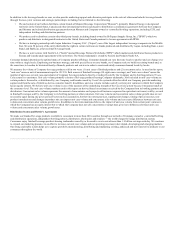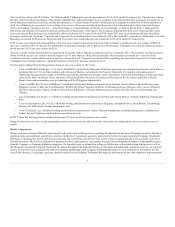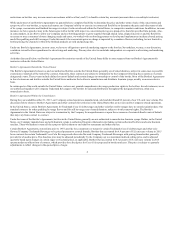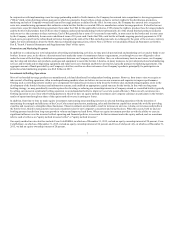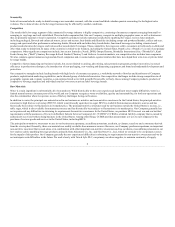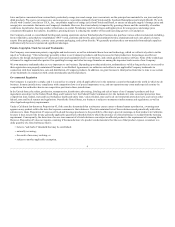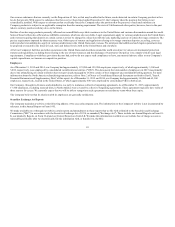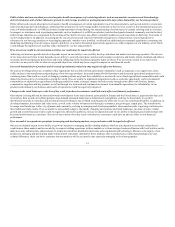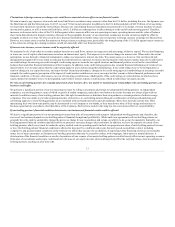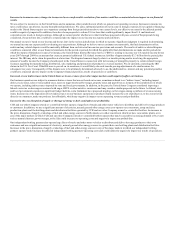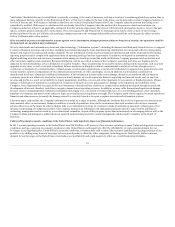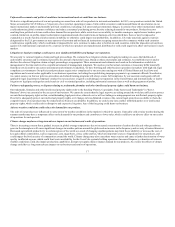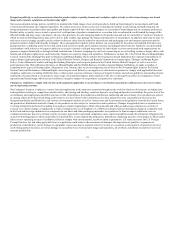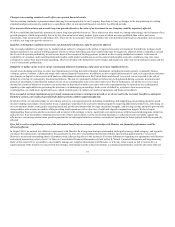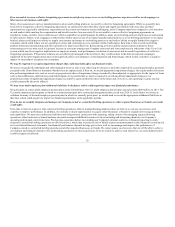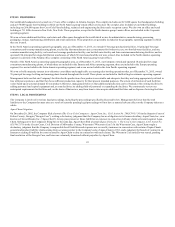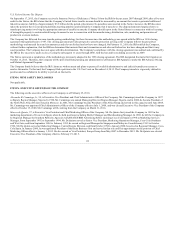Coca Cola 2015 Annual Report Download - page 16
Download and view the complete annual report
Please find page 16 of the 2015 Coca Cola annual report below. You can navigate through the pages in the report by either clicking on the pages listed below, or by using the keyword search tool below to find specific information within the annual report.
Increases in income tax rates, changes in income tax laws or unfavorable resolution of tax matters could have a material adverse impact on our financial
results.
We are subject to income tax in the United States and in numerous other jurisdictions in which we generate net operating revenues. Increases in income tax
rates could reduce our after-tax income from affected jurisdictions. We earn a substantial portion of our income in foreign countries. If our capital or financing
needs in the United States require us to repatriate earnings from foreign jurisdictions above our current levels, our effective tax rates for the affected periods
could be negatively impacted. In addition, there have been proposals to reform U.S. tax laws that could significantly impact how U.S. multinational
corporations are taxed on foreign earnings. Although we cannot predict whether or in what form these proposals will pass, several of the proposals being
considered, if enacted into law, could have a material adverse impact on our income tax expense and cash flows.
Our annual tax rate is based on our income and the tax laws in the various jurisdictions in which we operate. Significant judgment is required in determining
our annual income tax expense and in evaluating our tax positions. Although we believe our tax estimates are reasonable, the final determination of tax
audits and any related disputes could be materially different from our historical income tax provisions and accruals. The results of audits or related disputes
could have a material effect on our financial statements for the period or periods for which the applicable final determinations are made and for periods for
which the statute of limitations is open. For instance, the United States Internal Revenue Service ("IRS") is seeking to increase our U.S. taxable income for tax
years 2007 through 2009 by an amount that creates a potential additional U.S. federal income tax liability of approximately $3.3 billion for the period, plus
interest. The IRS may add a claim for penalties at a later time. The disputed amounts largely relate to a transfer pricing matter involving the appropriate
amount of taxable income the Company should report in the United States in connection with its licensing of intangible property to certain related foreign
licensees regarding the manufacturing, distribution, sale, marketing and promotion of products in overseas markets. We are currently contesting the IRS'
claims in the U.S. Tax Court. If the IRS were to prevail on its assertions, it would likely also seek transfer pricing adjustments of a similar nature for
subsequent tax years. Consequently, if this dispute were to be ultimately determined adversely to us, the additional tax, interest and any potential penalties
could have a material adverse impact on the Company's financial position, results of operations or cash flows.
Increased or new indirect taxes in the United States or in one or more of our other major markets could negatively affect our business.
Our business operations are subject to numerous duties or taxes that are not based on income, sometimes referred to as "indirect taxes," including import
duties, excise taxes, sales or value-added taxes, taxes on sugar-sweetened beverages, property taxes and payroll taxes, in many of the jurisdictions in which
we operate, including indirect taxes imposed by state and local governments. In addition, in the past, the United States Congress considered imposing a
federal excise tax on beverages sweetened with sugar, HFCS or other nutritive sweeteners and may consider similar proposals in the future. As federal, state
and local governments experience significant budget deficits, some lawmakers have proposed singling out beverages among a plethora of revenue-raising
items. Increases in or the imposition of new indirect taxes on our business operations or products would increase the cost of products or, to the extent levied
directly on consumers, make our products less affordable, which may negatively impact our net operating revenues and profitability.
Increase in the cost, disruption of supply or shortage of energy or fuels could affect our profitability.
CCR and our other Company-owned or -controlled bottlers operate a large fleet of trucks and other motor vehicles to distribute and deliver beverage products
to customers. In addition, we use a significant amount of electricity, natural gas and other energy sources to operate our concentrate, syrup and juice
production plants and the bottling plants and distribution facilities operated by CCR and our other Company-owned or -controlled bottlers. An increase in
the price, disruption of supply or shortage of fuel and other energy sources in North America, in other countries in which we have concentrate plants, or in
any of the major markets in which CCR and our other Company-owned or -controlled bottlers operate that may be caused by increasing demand or by events
such as natural disasters, power outages, or the like could increase our operating costs and negatively impact our profitability.
Our independent bottling partners also operate large fleets of trucks and other motor vehicles to distribute and deliver beverage products to their own
customers and use a significant amount of electricity, natural gas and other energy sources to operate their own bottling plants and distribution facilities.
Increases in the price, disruption of supply or shortage of fuel and other energy sources in any of the major markets in which our independent bottling
partners operate would increase the affected independent bottling partners' operating costs and could indirectly negatively impact our results of operations.
14


